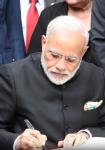This column could just as well have been called 'my sister's dilemma', but since most readers of this column don't really know my sister, but have at least heard of Pradip Baijal, the newly-appointed Telecom Regulatory Authority of India chief gets to feature in the headline. In any case, in a sense, their dilemma are similar, though from different ends of the spectrum.
Like a few million other Indians, my sister too, wanted to buy a Reliance Infocomm WiLL-mobile phone, whose tariffs (both for STD and local calls) are 40 paise per minute, as opposed to the Rs 1.50 or so that I pay for my cellphone.
But, while the Reliance and Tata Telecom tariffs have been kept in abeyance by Baijal's Trai, the Tata ads splashed across all major dailies show these rates have been sharply revised upwards, to Rs 1.20 a minute.
So where's the 'poor man's mobile' that was advertised so strongly by not just the companies concerned, but even by the government?
Even the recommendations by M S Verma's Trai (Baijal's predecessor), issued in January 2001, speak of the 40 paise tariff per minute. The GoT-IT, the courts, everyone's been talking of a 40 paise tariff, and suddenly we're told it's Rs 1.20.
This hike is because of the IUC, or the interconnect user charge regime brought in by the Trai from the first of this month, someone explained to my sister.
Under this, everytime someone calls someone else on a different network (like from a Hutch cell to a BSNL landline), a charge has to be paid.
Sounds good, but not true. If you see the IUC table, when you call a cellular phone from a WiLL-mobile, you have to pay an IUC charge of just 30 paise per minute. So, the call charge should only be 40 paise plus 30, or 70 paise per minute, not Rs 1.20.
The point is simple: if these WiLL-mobile firms have got over 1.5 million subscribers today primarily because of the 40 paise tariffs, why did the Trai allow them to get away with this under the garb of promotional tariffs?
It gets worse. Under the IUC notification that was issued on January 24 this year, the IUC charges are 30 paise a minute when you make a call from a WiLL-mobile phone to a cellphone, and 50 paise if you call a land-line.
Since the Trai officials at least knew this, they knew that the claims of a 40 paise tariff being advertised were untrue.
Yet, they kept quiet while 1.5 million unsuspecting souls went and bought WiLL-phones -- unsubscribing from these networks, by the way, is hardly as inexpensive as the Trai will have you believe, since the Rs 3,000 or so that you pay for 'club membership' is unrefundable. Baijal, poor man, cannot, however, do anything about this, as it was before his time that this happened.
A similar problem applies to the STD rates advertised then: 40 paise. According to the IUC tariff chart, the average carriage charge for long-distance calls is 75 paise a minute (it ranges from 20 paise for 0-50 kms to Rs 1.10 for above 500 km).
So, the very least that an IUC-compatible STD call should cost is 75 paise a minute. Yet, despite the IUC tariffs being issued in January, the Trai allowed 40 paise rates to be advertised.
Of course, what's equally strange is the Trai's insistence that Reliance not be allowed to go ahead with its 40 paise tariff for STD calls on Reliance-to-Reliance phones.
One problem, it appears, is that Reliance is not offering the same tariff to subscribers of rival networks, like say, Hutch -- that is, if Hutch wants to carry a call on Reliance's STD network, it should also pay just 40 paise a minute.
This, of course, appears reasonable since the only way public services can work is if they're equally accessible to everyone, at the same price.
What's not understandable, is the insistence that Reliance charge an IUC-compatible average of 75 paise per minute for its STD calls.
The reason for this, apparently, is that it is only at this tariff that Bharat Sanchar Nigam Limited can survive.
Strange, isn't it? In most other markets, when new players come in, they break the incumbent's monopoly by charging lower prices -- in fact, it is the incumbent monopolists who are prevented from charging below-cost to kill competition. Here, the incumbent monopolist is being protected!
Actually, there is some method to Trai's madness. The reason why it needs to force a higher STD tariff is that it is largely from this money that BSNL is able to provide highly-subsidised and unremunerative phones in rural areas -- of BSNL's 4-crore fixed telephones, 50-60 per cent don't break even.
But the solution to this problem, instead of the Trai examining scores of tariff plans every six months, would be to force the private service providers to share BSNL's burden -- in the sense that they also be asked to set up phones in uneconomic villages/rural areas.
Baijal, I'm sure, would prefer to do this, since the Trai deciding on each tariff is not just a back-breaking exercise, it opens it up to allegations of favouritism.
But the problem is that when, on August 31, 2000, the previous Trai came up with its recommendations on fixed-line service provider licences, thy did not put in these obligations.
Poor Baijal. He's got a real mess to clean up. And you thought post-retirement regulator jobs were a insecure.





